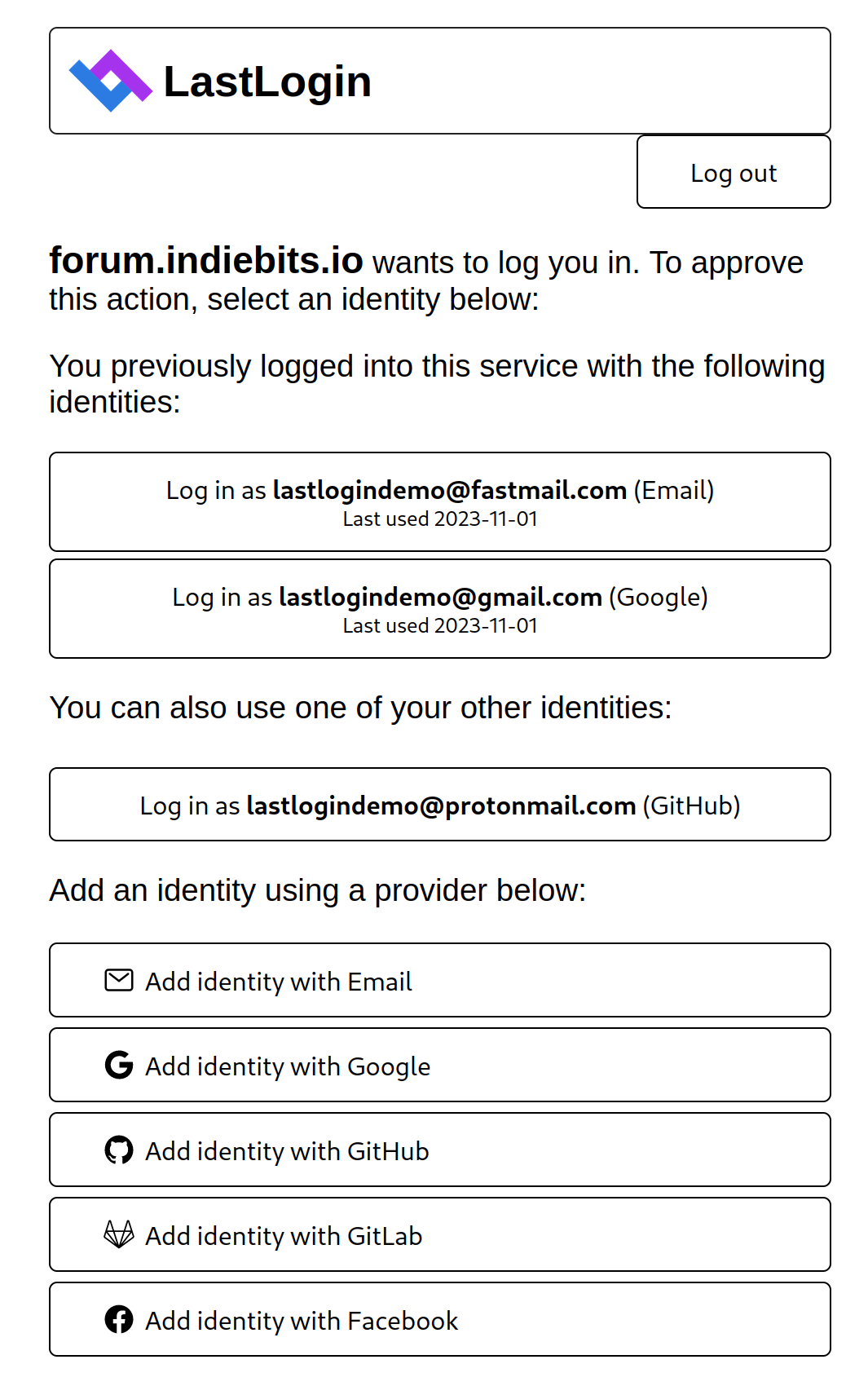Introduction
LastLogin is a login provider. It enables you to sign in to apps and websites with the convenience of "social login" (like Google, Facebook, Apple, etc), while greatly improving privacy. Instead of choosing from a small set of login providers, with LastLogin you can use any email address you want as your identifier, and even choose from many different email addresses when you log in to a site. LastLogin is built on open source software.
Our mission is to push the web toward decentralized identity and login, to improve user experience, choice, and security.
Funding
LastLogin is primarily donation-funded. If you find it useful, or simply want it to succeed, please see the pricing page for ways to donate.
Demo
The best way to see LastLogin in action is to use it to log in to the IndieBits forums. That is also where support for LastLogin is provided.
There's also a demo video:
YouTube Download WebM/VP9 Download MP4/h264Here's a screenshot of the basic UI:

FAQ
Why did you make this?
I wanted my users to have the convenience of social login without sacrificing their privacy. Personally I also have been using email+password whenever possible and avoiding social login, but I'm tired of doing this. The UX is terrible. There weren't any alternatives so I made one.
How does it work?
The best way to get a feel is to try the demo. The core user experience is very similar to current login providers. An app or website will have a "Sign in with LastLogin" button alongside the others.
The main difference is in how you manage identities. When you click to log in with LastLogin, you're taken to a page that lets you add email identities from many sources. You can directly add an email by entering a code we email you, or you can add an email using one of the social providers. Once you've added some email identites, whenever you log in to an app or site you can choose which one you want to use.
What is a decentralized login system?
Almost everything you do online is tied to an account or online identity. When you use a "Sign in with Google" button or a gmail address to create a new account, you're giving incredible power to Google to observe and control access to your online life.
A decentralized login system puts the control back in your hands. You can use any email provider you want, and still get the convenience of social login. Ideally you can even use your own domain name and switch between email providers easily. This fosters competition and leads to much better user experience.
It's even possible to run your own email server, which provides even more privacy and control.
How does adding another centralized login provider push the web towards decentralized login?
It's a chicken-egg problem. Apps and websites aren't going to implement decentralized login until there are providers that use decentralized protocols, and login providers aren't going to implement decentralized login until users and developers demand it. LastLogin is a stepping stone. A temporary solution. It supports the same centralized protocols as other login providers, but it will also support decentralized protocols. This will allow app developers to integrate with LastLogin using those protocols, and easily integrate with other decentralized providers in the future.
Step one is that LastLogin supports email addresses from any email provider, and let's you choose which email identity to use when you log in. No social login provider gives this level of control.
How is LastLogin privacy-focused?
When you use a social login provider such as Google, that provider knows and keeps a record of every app and website you sign in to.
Generally social login providers are advertising companies. This is no accident. There is a strong advertising incentive for them to know as much about you as possible.
LastLogin improves privacy in several ways. First, we don't collect or store any private data. Also, our incentives are much more aligned. Since we don't sell ads, we have far less incentive to track our users.
How does LastLogin improve security?
Since we only require the minimal login information (email address), the consequences of any security breach in either an app you use or in our systems directly is greatly reduced.
Contrast this with a company like Google that provides many APIs and services using the same system they use for login. This makes things like phishing attacks much more dangerous.
Why does LastLogin let me add identities with social providers? Can't the app or website just use those directly?
Yes, however going through LastLogin provides some benefits. First of all, it's much easier for developers. Instead of having to register their app with each social provider, jumping through many hoops along the way, they only need to support LastLogin (which also happens to be the easiest provider to integrate with), while still giving their users the convenience of social login.
Additionally, there's a privacy benefit here. Say you want to use your Facebook account to log in to an app that supports LastLogin. If you use the LastLogin option to add your Facebook identity, Facebook has no idea what app you're actually logging in to. Note that this isn't as helpful with Google. Although they won't know directly when you're logging in, if the app sends any emails to your gmail account they'll be able to infer what apps you're using.